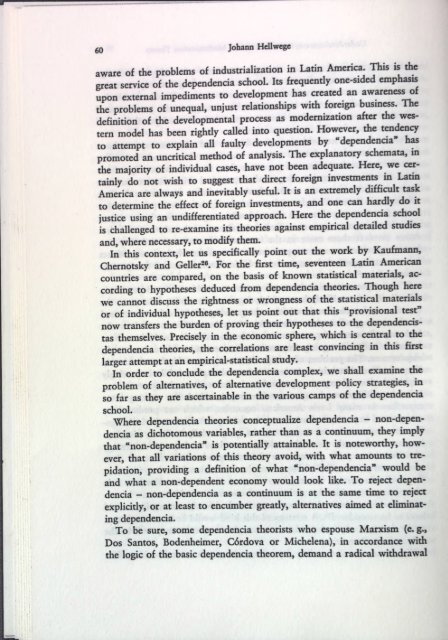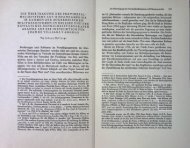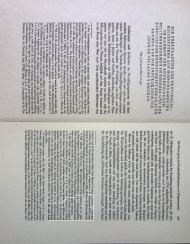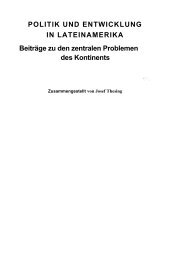9_Law and State_Volume 17
Create successful ePaper yourself
Turn your PDF publications into a flip-book with our unique Google optimized e-Paper software.
60<br />
Johann Hellwege<br />
aware of the problems of industrialization in Latin America. This is the<br />
great service of the dependencia school. Its frequently one-sided emphasis<br />
upon external impediments to development has created an awarenessof<br />
the problems of unequal, unjust relationships with foreign busmess. The<br />
definition of the developmental process as modernization after the western<br />
model has been righdy called into question. However, the tendency<br />
to attempt to explain all faulty developments by “dependencia has<br />
promoted an uncritical method of analysis. The explanatory schemata, in<br />
the majority of individual cases, have not been adequate. Here, we certainly<br />
do not wish to suggest that direct foreign investments in Latin<br />
America are always <strong>and</strong> inevitably useful. It is an extremely difficult tas<br />
to determine the effect of foreign investments, <strong>and</strong> one can hardly do it<br />
justice using an undifferentiated approach. Here the dependencia school<br />
is challenged to re-examine its theories against empirical detailed studies<br />
<strong>and</strong>, where necessary, to modify them.<br />
In this context, let us specifically point out the work by Kaufmann,<br />
Chernotsky <strong>and</strong> Geller28. For the first time, seventeen Latin American<br />
countries are compared, on the basis of known statistical materials, according<br />
to hypotheses deduced from dependencia theories. Though here<br />
we cannot discuss the rightness or wrongness of the statistical materials<br />
or of individual hypotheses, let us point out that this “provisional test”<br />
now transfers the burden of proving their hypotheses to the dependencistas<br />
themselves. Precisely in the economic sphere, which is central to the<br />
dependencia theories, the correlations are least convincing in this first<br />
larger attempt at an empirical-statistical study.<br />
In order to conclude the dependencia complex, we shall examine the<br />
problem of alternatives, of alternative development policy strategies, in<br />
so far as they are ascertainable in the various camps of the dependencia<br />
school.<br />
Where dependencia theories conceptualize dependencia - non-dependencia<br />
as dichotomous variables, rather than as a continuum, they imply<br />
that “non-dependencia” is potentially attainable. It is noteworthy, however,<br />
that all variations of this theory avoid, with what amounts to trepidation,<br />
providing a definition of what “non-dependenda” would be<br />
<strong>and</strong> what a non-dependent economy would look like. To reject dependencia<br />
- non-dependenda as a continuum is at the same time to reject<br />
explicitly, or at least to encumber greatly, alternatives aimed at eliminating<br />
dependencia.<br />
To be sure, some dependencia theorists who espouse Marxism (e. g.,<br />
Dos Santos, Bodenheimer, Cdrdova or Michelena), in accordance with<br />
the logic of the basic dependencia theorem, dem<strong>and</strong> a radical withdrawal
















